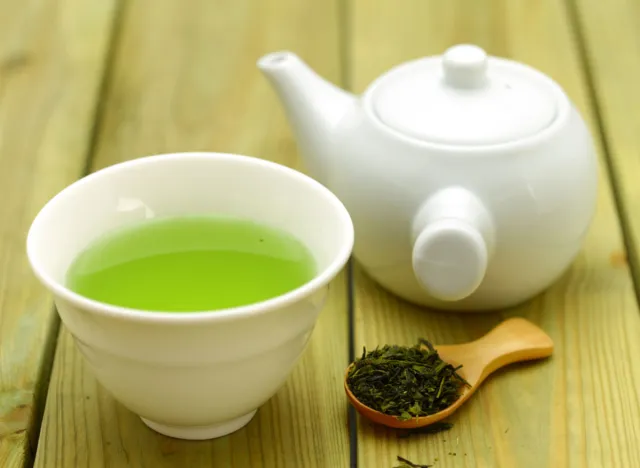#1 Best Drink for Leaky Gut, New Study Suggests

If you enjoy steeping a big kettle of green tea to sip on throughout the morning, then you're in luck! A team of researchers from Penn State and Ohio State University recently released a study that looked at the possible effects of green tea on leaky gut by examining the correlation between catechin-dense green tea extract and gut health.
Originally published in Current Developments in Nutrition, the implications of the clinical study suggest that green tea's anti-inflammatory properties may prove beneficial to your belly by reducing leaky gut symptoms. Green tea extract was able to reduce blood sugar levels and inflammation while mitigating leaky gut, which could ultimately decrease the odds of developing other chronic health conditions.
This revelation is especially important for those with metabolic syndrome: A serious health diagnosis that generally applies when someone presents three or more metabolic risk factors often associated with cardiovascular disease, like high blood pressure, high blood sugar, and low HDL cholesterol.
Here's how drinking green tea might help soothe your leaky gut and improve the quality of your overall gut health.
What is leaky gut?

Though not technically a formal medical diagnosis, leaky gut syndrome is a "hypothetical condition" related to the extent of one's intestinal permeability. Symptoms include but are not limited to gas, bloating, cramps, and food sensitivities.
Considered the largest immune system organ, your gut essentially acts as a gatekeeper to your overall health, controlling your propensity for inflammation and other signs of metabolic syndrome. It's naturally semipermeable, which enables your body to absorb water and nutrients from everything you consume each day and move it all into your bloodstream. However, higher rates of intestinal permeability or hyperpermeability might signify a leaky gut.
Increased intestinal permeability ("leaky gut") occurs when the lining of your small intestine—which typically prevents bacteria and other infectious agents from absorbing into your bloodstream—is unable to effectively discriminate between these toxins and the nutrients your body needs. When your intestinal lining starts letting larger, potentially toxic molecules access your bloodstream, it might provoke an inflammatory reaction that can translate into a variety of illnesses.
"If we can improve gut integrity and reduce leaky gut, the thought is we'll be able to not only alleviate low-grade inflammation that initiates cardiometabolic disorders, but potentially reverse them," Richard Bruno, senior study author and professor of human nutrition at Ohio State University, reportedly told ScienceDaily.
What happened in the study?
The study was comprised of 40 participants: 19 were considered "healthy adults" and the remaining 21 were reportedly diagnosed with metabolic syndrome. For the first 28 days of the clinical trial, researchers gave all study participants gummy supplements containing green tea extract rich in catechins: the main polyphenol compounds found in this caffeinated leaf that have been linked to anti-cancer benefits, among other things. Researchers also gave participants dosage instructions for the supplement that would be equivalent to drinking roughly five cups of green tea per day.
To ensure trial data accuracy and avoid potentially skewed results, participants also adhered to a diet that was low in polyphenols, which are antioxidants that are typically found in fruits, vegetables, spices, and teas. This helped researchers determine if the polyphenols found in green tea really did have an effect on participants.
So, how does green tea affect leaky gut?

After measuring pro-inflammatory proteins in stool samples of the participants, researchers came to the conclusion that consuming green tea extract can help lower blood sugar levels and lessen gut inflammation. They even observed a reduction in blood glucose levels, gut inflammation, and permeability in their cohort of healthy study participants.
"What this tells us is that within one month, we're able to lower blood glucose in both people with metabolic syndrome and healthy people, and the lowering of blood glucose appears to be related to decreasing leaky gut and decreasing gut inflammation—regardless of health status," Bruno said.
Although the one-month study was not designed with the hopes of curing metabolic syndrome, Bruno explained to ScienceDaily that the results indicate greater promise for leveraging green tea to promote a healthy gut.
"Based on what we know about the causal factors behind metabolic syndrome, there is potential for green tea to be acting at least in part at the gut level to alleviate the risk for either developing it or reversing it if you already have metabolic syndrome," he said.







